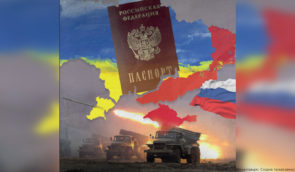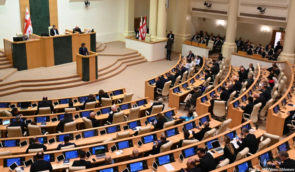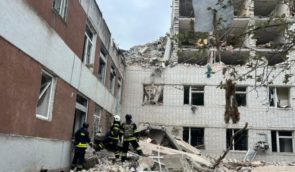How Ukrainian authorities have to stop violate rights of its citizen in Crimea – recommendations of human rights defenders
For the upcoming year 2017, human rights defenders appeal to the Ukrainian government and parliament (Verkhovna Rada) to make a “friendly move towards Crimeans” by amending legislation that limits enjoyment of human rights vis-à-vis individuals who resettled from or are still residing in Crimea.
So noted Tetiana Pechonchyk, Chair of the Board for the Human Rights Information Centre at the press-conference in Kyiv.
“There is a common perception that since Crimea is under occupation, all responsibility for human rights violations on the peninsula rests with the Russian Federation as the occupying state. Yet, it is not the case. Unfortunately, throughout the last two years the Ukrainian authorities have also adopted a number of regulations that affect the rights of Crimean citizens, create barriers and narrow the opportunities for enjoying rights and exercising freedoms on the Crimean peninsula – including, for instance, the freedom of movement and property rights” – she noted.
Coordinator for the Crimean Human Rights Group, Olga Skrypnyk, added: “It is clear that as of today, the government has no ability to fully defend the rights and interests of citizens in Crimea. At the same time, Ukraine bears full weight of responsibility for ensuring human rights and freedoms first and foremost on the territories under its control in respect to all of its citizens. Yet, current regulatory frameworks have solidified discriminatory practices with respect to Ukrainian citizens residing on the occupied territories. These citizens are faced with groundless limitations imposed on their fundamental rights and freedoms, as well as socio-economic rights in territories under control of Ukrainian authorities. These discriminatory practices are in no way fostering re-integration of the occupied territories”.
CHALLENGES OF EVACUATING PROPERTY FROM CRIMEA
Amongst other issues, human rights defenders are criticizing the Cabinet of Ministers Decree #1035 that came into effect on 15 January 2016. It limits the listing and volumes of socially-important goods that may be transported from and to Crimea. Thus, the total value of such items shall not exceed UAH 10 thousand and shall be under 50 kilograms per one person.
“After this Decree was adopted – in violation of the Law “On Ensuring Rights and Freedoms of Internally Displaced Persons” – Crimeans were de facto deprived of their right to evacuate their belongings and to use them on the “mainland”” – so noted Daria Svyrydova, lawyer for the Ukrainian Helsinki Human Rights Union.
On 26 September 2016, Odesa district administrative court ruled that Kherson customs department of the State Fiscal Service of Ukraine acted illegally by denying an internally displaced person the entrance to the mainland Ukraine from Crimea based on the fact that the person’s personal possessions were not on the list of those allowed on the above-mentioned listing.
NON-RESIDENT STATUS FOR CRIMEANS
For two years now, the issue of “non-resident” status for Crimeans and the resulting problems with using banking services have lingered on. “Sadly, we must note that the courts have been considering abolishment of the discriminatory National Bank Decree #699 that imposes the “non-resident” status on Crimeans – concerning close to two million Crimean residents and no less than 20 thousand IDPs from Crimea – for over a year now” – emphasized Daria Svyrydova.
She noted that the discriminatory nature of the NBU Decree #699 was noted in the OHCHR Report on the human rights situation in Ukraine: 16 November 2015 to 15 February 2016. The Plenum of the Supreme Court of Ukraine also opined that the National Bank of Ukraine at its own discretion equated “customs payments” and “taxes” with regulatory actions aimed at currency and foreign economic activity issues, thus twisting the definitions in the area of economics. Despite all of this, the ultimate ruling in the case that concerns discrimination of two million Crimeans is not yet passed.
ISSUES WITH ENTRY TO CRIMEA
One more issue, according to Tetiana Pechonchyk, is the 2015 regulation for issuing special permits for foreign nationals who wish to travel to Crimea (Decree of the Cabinet of Ministers of Ukraine as of 4 June 2015 № 367 amended as of 16 September 2015 (through Decree №722)). This regulation is excessively plagued by red tape, and provides for a host of challenges for work of foreign journalists, lawyers and human rights defenders in Crimea.
“In order to receive the special permit, a foreign journalist or human rights defender has to come to Ukraine, file the documents in Ukrainian, receive a letter of approval from the Ministry of Information Policy or Ministry of Foreign Affairs, take all of the papers to the State Migration Service of Ukraine and – on top of it all – wait for up to 5 days. There is no mechanism to file the documents from abroad through consular and diplomatic offices of Ukraine; documents may not be submitted in English. Instead of reporting on repressions in Crimea, foreign journalists are wearing their patience thin, wasting time and money to cut through this red tape” – she stated.
In addition, according to Tetiana Pechonchyk, the relevant government decree contains an exhaustive list of foreign nationals’ categories which may be entitled for a special permit to enter Crimea. The list fails to mention lawyers, documentary film producers or researchers whose presence is important to document and report on the human rights situation.
According to Daria Svyrydova, the said Decree also regulates procedure for admission of Ukrainian citizens to and from the territory of Crimea which is in express violation both of the Law of Ukraine “On Securing the Rights and Freedoms of Citizens and the Legal Regime on the Temporarily Occupied Territory of Ukraine” (which obliges the Cabinet to regulate the procedure for only foreign nationals and stateless persons) and the international standards for freedom of movement. Thus, any restrictions for the freedom of movement within a country for its own citizens may be imposed only through a law, by indicating a legitimate goal justified in a democratic society.
RECOMMENDATIONS
Human rights defenders note a number of positive steps taken by the state bodies (Ministry of Temporarily Occupied Territories and IDPs, Ministry of Justice, Ministry of Foreign Affairs and others) regarding amendments to legislation that regulates the rights of persons from the occupied Crimean territories. They hope for further emergence of the relevant agenda, and strategic vision for such change with a view to de-occupation of the peninsula rather than ad-hoc reaction to challenges.
“The state has to finally delineate its position vis-à-vis Crimea and Crimeans – whether it is a blockade or comprehensive support and assistance to people. We believe that the international standards for human rights have to be pointing out the way of assisting the individuals from the occupied territories to enjoy their rights and freedoms guaranteed by the sovereign country. It is no less important to ensure coordination between state bodies that work to perfect legislation to protect the rights of persons from the occupied territories, as well as decision-makers. This coordination, it seems, is either lacking in most cases or fails to bear fruit of mutual understanding” – believes Daria Svyrydova.
In order to protect the rights of Crimeans, human rights defenders advise in 2017 to:
– Retract the National Bank of Ukraine Decree #699 that classifies Crimeans as “non-residents” under Ukrainian law; the noted Decree is discriminatory and violates both human rights and current Ukrainian legislation.
– Develop amendments and introduce them to the Decree #1035 in order to avoid violating the right to property as envisaged by Article 1 of Protocol 1 to the European Convention on Human Rights and enjoyment of the right to evacuation of property by persons who are relocating from the territory of Crimea.
– Amend the current Ukrainian legislation pertaining to economic relations with Crimea to align to principles of human rights and non-discrimination – including through adoption of the Recommendations of the Parliamentary Hearings “Strategy for re-integration to Ukraine of the temporarily occupied territory of the Autonomous Republic of Crimea and the city of Sevastopol: problems, ways, methods and means”. This would include retraction of the Law that establishes a “free economic zone” of Crimea, and adoption of a new law – on economic activity in the temporarily occupied territories.
– Simplify the procedure for access of foreign journalists, international human rights missions and lawyers to Crimea. Amongst other things, institute a notification-based instead of a permit-based mechanism for admission, and introduce a system of simplified permits for international human rights defense missions and stand-alone rights-defenders / journalists / lawyers that aim at monitoring and defending human rights or reporting on the human rights situation in Crimea.
– Develop and introduce amendments to the regulation for admission to and from temporarily occupied territories as introduced through the Cabinet of Ministers Decree #367 as of 04.06.2015 – to avoid violating the right to freedom of movement for Ukrainian citizens under the age of 18.
***
The event was organised by Human Rights Information Center with participation of Ukrainian Helsinki Human Rights Union and Crimean Human Rights Group. For more information, please dial (067)445-95-43 or contact us through e-mail: tp@humanrights.org.ua








